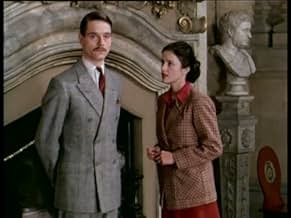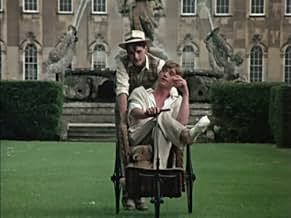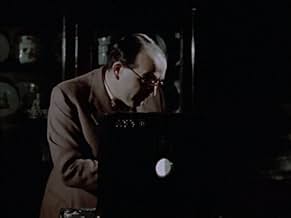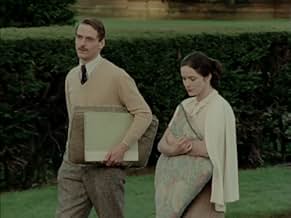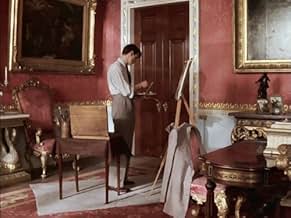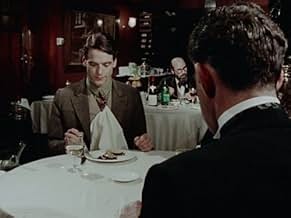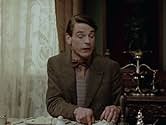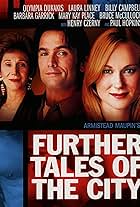The life, friendships and romances of the protagonist Charles Ryder-including his friendship with the Flytes, a family of wealthy English Catholics who live in a palatial mansion called Brid... Read allThe life, friendships and romances of the protagonist Charles Ryder-including his friendship with the Flytes, a family of wealthy English Catholics who live in a palatial mansion called Brideshead Castle.The life, friendships and romances of the protagonist Charles Ryder-including his friendship with the Flytes, a family of wealthy English Catholics who live in a palatial mansion called Brideshead Castle.
- Won 1 Primetime Emmy
- 13 wins & 19 nominations total
Browse episodes
Featured reviews
Everyone is of course entitled to an opinion about matters such as this, but how anyone can rate this series as anything less than a great milestone in television is, to my mind at least, quite difficult to understand.
I recently re-read Evelyn Waugh's wonderful novel and was, consequently, inspired to watch the series for the fourth time, on DVD on this occasion. It is disappointing that the DVD boxed set contains no additional features as one would expect from a series which is so highly regarded by so many people. At least, interviews with the stars and comments by the Director, Charles Sturridge, would have been welcome. In that respect, the DVD set can be seen to be somewhat lacking.
However, the acting, direction, costume design, sets and John Mortimer's brilliant adaptation of the novel for television make this one of the greatest achievements in television and a demonstration of what can be accomplished in that medium with a great deal of care for detail.
What I find particularly heart-rending is the transition from the light and airy early scenes to the darker ending of the series. I am really not sure whether this comment contravenes the "spoiler" guidelines but I suspect that I'm on reasonable safe ground in that regard.
I would go so far as to suggest that "Brideshead Revisited" lives up to the comments which were made about it at the time of its release in the early '80s that it is one of the greatest television series ever produced and it is hardly surprising to me at least that a series of such enduring quality emanated from the UK.
10 out of 10 from me. I am looking forward to reading the book and seeing the series again at some time in the not too distant future.
Please do yourselves a great favour and read the novel and then see the series. You will find, as I have done, that it is a true classic and a faithful adaptation from the novel to the small screen.
I recently re-read Evelyn Waugh's wonderful novel and was, consequently, inspired to watch the series for the fourth time, on DVD on this occasion. It is disappointing that the DVD boxed set contains no additional features as one would expect from a series which is so highly regarded by so many people. At least, interviews with the stars and comments by the Director, Charles Sturridge, would have been welcome. In that respect, the DVD set can be seen to be somewhat lacking.
However, the acting, direction, costume design, sets and John Mortimer's brilliant adaptation of the novel for television make this one of the greatest achievements in television and a demonstration of what can be accomplished in that medium with a great deal of care for detail.
What I find particularly heart-rending is the transition from the light and airy early scenes to the darker ending of the series. I am really not sure whether this comment contravenes the "spoiler" guidelines but I suspect that I'm on reasonable safe ground in that regard.
I would go so far as to suggest that "Brideshead Revisited" lives up to the comments which were made about it at the time of its release in the early '80s that it is one of the greatest television series ever produced and it is hardly surprising to me at least that a series of such enduring quality emanated from the UK.
10 out of 10 from me. I am looking forward to reading the book and seeing the series again at some time in the not too distant future.
Please do yourselves a great favour and read the novel and then see the series. You will find, as I have done, that it is a true classic and a faithful adaptation from the novel to the small screen.
Evelyn Waugh's 'Brideshead Revisited' is, I think, the quintessential and the finest novel of the twentieth century - English literature at its highest form. And this 1981 miniseries does the novel great justice: its episodes give us television's finest hours.
The splendid cast makes the most of the rich script, which is as faithful to a novel as a script can be. My favorite is Phoebe Nicholls as Lady Cordelia: her performance is disarming, utterly charming. And Nickolas Grace plays to the hilt the sybaritic, viper-tongued Anthony Blanche.
Jeremy Irons does sterling service as the narrator, Charles Ryder, who is, after all, Waugh's observant eye and eloquent tongue; Irons depicts poignantly Ryder's "conversion to the Baroque" crashing to bits against the cold gracelessness of "The Age of Hooper". As the rapidly dissolving Lord Sebastian Flyte Anthony Andrews is memorable - should Waugh's book ever again be adapted for the screen the lot of the actor cast as Sebastian will not be enviable.
Claire Bloom's Lady Marchmain is a study in quiet dignity upheld vainly in the face of the twentieth century's ravaging of her character's world and sensibilities. Sir Laurence Olivier's Lord Marchmain is letter-perfect; and in the deathbed sequences Olivier's performance is tenderly, expertly nuanced.
Diana Quick was a bit too old to play convincingly the debutante Lady Julia of the early episodes, but in the later ones Quick hits perfectly every disillusioned, jaded, repentant note. Charles Keating as Rex, who inhabits a "harsh acquisitive world", is an exemplar of shallowness, of the venality Waugh detested - and satirized so hilariously in his earlier novels: he's nothing more than a Hooper with money and ambition.
Simon Jones gives us Bridey's stodginess and bewliderment with marvelous understatement. John Gielgud steals every scene as Charles's father Edward, brilliantly interpreting of one of Waugh's most delicious, yet indigestible characters.
There are rich offerings, too, from character actors: Stephane Audran glows warmly as Clara, Lord Marchmain's insightful, intuitive, down-to-earth mistress; John LeMesurier leaves us suitably agape as the Jesuit Father Mowbray baffled and dismayed by Rex's utilitarian approach to his conversion to Catholicism; Jeremy Sinden sails naively along as the indefatigable yet ever-dimwitted and clueless Boy Mulcaster; Ronald Fraser stirs just the right sloshing of queasiness as the peculiar, opportunistic shipboard cocktail party guest; Jonathan Coy, as the parlous, seedy Kurt, is perfectly repellent; Jane Asher tiptoes delicately through Celia Ryder's conventional, porcelain sensibilities; and Mona Washbourne knits a thoughtful, lovely portrait of Nanny Hawkins.
Throughout 'Brideshead Revisited' the photography is lush, meticulous, yet tasteful. The score is understated, never intrusive, always complementary. Costuming, set design and, above all, location, are unrivalled. Charles Sturridge's direction is evenhanded, assured - and his pacing of the narrative treads adroitly every beautifully-modulated beat.
I bought the DVD version of this series and, though occasional bits of the image transfer are a trifle fuzzy and the sound re-recording is sometimes uneven, the nicely boxed set of discs pleased - and goes on pleasing - me greatly.
In the early third millennium, a time of evermore immature programming and production executives - a dismal age of TV's Hoopers, I have to suspect sadly that television will never again attain the heights to which 'Brideshead Revisited' vaulted. But I shall remain ever grateful for this magnificent series.
The splendid cast makes the most of the rich script, which is as faithful to a novel as a script can be. My favorite is Phoebe Nicholls as Lady Cordelia: her performance is disarming, utterly charming. And Nickolas Grace plays to the hilt the sybaritic, viper-tongued Anthony Blanche.
Jeremy Irons does sterling service as the narrator, Charles Ryder, who is, after all, Waugh's observant eye and eloquent tongue; Irons depicts poignantly Ryder's "conversion to the Baroque" crashing to bits against the cold gracelessness of "The Age of Hooper". As the rapidly dissolving Lord Sebastian Flyte Anthony Andrews is memorable - should Waugh's book ever again be adapted for the screen the lot of the actor cast as Sebastian will not be enviable.
Claire Bloom's Lady Marchmain is a study in quiet dignity upheld vainly in the face of the twentieth century's ravaging of her character's world and sensibilities. Sir Laurence Olivier's Lord Marchmain is letter-perfect; and in the deathbed sequences Olivier's performance is tenderly, expertly nuanced.
Diana Quick was a bit too old to play convincingly the debutante Lady Julia of the early episodes, but in the later ones Quick hits perfectly every disillusioned, jaded, repentant note. Charles Keating as Rex, who inhabits a "harsh acquisitive world", is an exemplar of shallowness, of the venality Waugh detested - and satirized so hilariously in his earlier novels: he's nothing more than a Hooper with money and ambition.
Simon Jones gives us Bridey's stodginess and bewliderment with marvelous understatement. John Gielgud steals every scene as Charles's father Edward, brilliantly interpreting of one of Waugh's most delicious, yet indigestible characters.
There are rich offerings, too, from character actors: Stephane Audran glows warmly as Clara, Lord Marchmain's insightful, intuitive, down-to-earth mistress; John LeMesurier leaves us suitably agape as the Jesuit Father Mowbray baffled and dismayed by Rex's utilitarian approach to his conversion to Catholicism; Jeremy Sinden sails naively along as the indefatigable yet ever-dimwitted and clueless Boy Mulcaster; Ronald Fraser stirs just the right sloshing of queasiness as the peculiar, opportunistic shipboard cocktail party guest; Jonathan Coy, as the parlous, seedy Kurt, is perfectly repellent; Jane Asher tiptoes delicately through Celia Ryder's conventional, porcelain sensibilities; and Mona Washbourne knits a thoughtful, lovely portrait of Nanny Hawkins.
Throughout 'Brideshead Revisited' the photography is lush, meticulous, yet tasteful. The score is understated, never intrusive, always complementary. Costuming, set design and, above all, location, are unrivalled. Charles Sturridge's direction is evenhanded, assured - and his pacing of the narrative treads adroitly every beautifully-modulated beat.
I bought the DVD version of this series and, though occasional bits of the image transfer are a trifle fuzzy and the sound re-recording is sometimes uneven, the nicely boxed set of discs pleased - and goes on pleasing - me greatly.
In the early third millennium, a time of evermore immature programming and production executives - a dismal age of TV's Hoopers, I have to suspect sadly that television will never again attain the heights to which 'Brideshead Revisited' vaulted. But I shall remain ever grateful for this magnificent series.
Old Bridie stuck with me for years between first seeing it and then reviewing on a tv re-run not long ago. The story of Charles and Sebastian and their families (and Sebastian's teddy bear) opens out Evelyn Waugh's slow-paced novel and instead of rushing through it in a couple of hours takes time to work with it and present the story at a leisurely pace, taking stock of some of the UK's greatest scenery.
Jeremy Irons and Anthony Andrews play the leads, who meet at University and become lifelong friends. Diana Quick and Phoebe Nicholls play Sebastian's sisters, and the two boys' fathers are played by no less than Olivier and Gielgud. Inspired casting. Mona Washbourne is also used well, along with Nickolas Grace.
I think the days of these long and involved dramas have long gone by in the climate of 'whatever grabs ratings quickest'. But Granada TV managed to make a British gem which will and should be remembered for many years. Excellent.
Jeremy Irons and Anthony Andrews play the leads, who meet at University and become lifelong friends. Diana Quick and Phoebe Nicholls play Sebastian's sisters, and the two boys' fathers are played by no less than Olivier and Gielgud. Inspired casting. Mona Washbourne is also used well, along with Nickolas Grace.
I think the days of these long and involved dramas have long gone by in the climate of 'whatever grabs ratings quickest'. But Granada TV managed to make a British gem which will and should be remembered for many years. Excellent.
10curt-28
It is exceptional to find something in life that improves with age. Brideshead Revisited is one of those exalted things. Having just completed watching the entire series I can say that it is actually better than I remembered when I first saw it over 15 years ago. Seldom do so many things (cast, writing, locations, costumes) come together and form a harmonious whole. Brideshead is a tour-de-force of the film maker's art that glows with a magical intensity all its own.
A dream cast with a magnificent script (John Mortimer) brings to life Evelyn Waugh's elegiac upon the between-wars years. Golden years and golden people are lost, and the sense of loss is captured in the changes inflicted on the buildings, and in Geoffrey Burgon's heart-wrenching score. Brideshead captures the clash of humanistic values with those of old-time Catholicism, while tracing the decline of an aristocratic (somewhat precious) family, in a series that is part comedy, part romance, part tragedy. It is an enriching experience that no-one should miss.
Storyline
Did you know
- TriviaOriginally, producer Derek Granger asked Anthony Andrews to play the role of Charles Ryder. Andrews, however, felt he was better suited for the part of Sebastian Flyte. Jeremy Irons, Granger's first choice for Sebastian, preferred to play Ryder, so the two actors swapped roles.
- Alternate versionsThe voiceover in the early Venice sequences was added for the American version after producer Derek Granger saw the initial British broadcast and felt there was not a strong enough sense of the religious feelings evoked while viewing the paintings.
- ConnectionsFeatured in The 34th Annual Primetime Emmy Awards (1982)
Details
- Release date
- Country of origin
- Language
- Also known as
- Wiedersehen mit Brideshead
- Filming locations
- Castle Howard, Henderskelfe, York, North Yorkshire, England, UK(Brideshead Castle: exterior and some interiors)
- Production company
- See more company credits at IMDbPro
Contribute to this page
Suggest an edit or add missing content

Top Gap
What is the Brazilian Portuguese language plot outline for Brideshead Revisited (1981)?
Answer



